Building Project Success: Cost Planning, QS Role & Team Impact
VerifiedAdded on 2023/06/03
|10
|2804
|485
Report
AI Summary
This report explores the critical factors influencing the success of building projects, emphasizing the roles of Quality Surveyors (QS) or cost managers and the importance of cost planning. It details how QS professionals ensure financial accuracy and manage contractual relationships, contributing to project success by advising on site potential and feasibility. The report highlights the diverse responsibilities of cost managers, including adhering to commercial processes, providing timely cost reporting, and maintaining client relationships. It also underscores the significance of cost planning in determining project viability, structuring financing, and ensuring profitability. Furthermore, the report investigates how cost planning improves financial success by controlling costs, allocating resources effectively, and enabling accurate budgeting. Finally, it examines the impact of project teams through preventative and corrective measures, focusing on communication, problem-solving, and continuous improvement to achieve project goals within constraints such as time, quality, and scope.
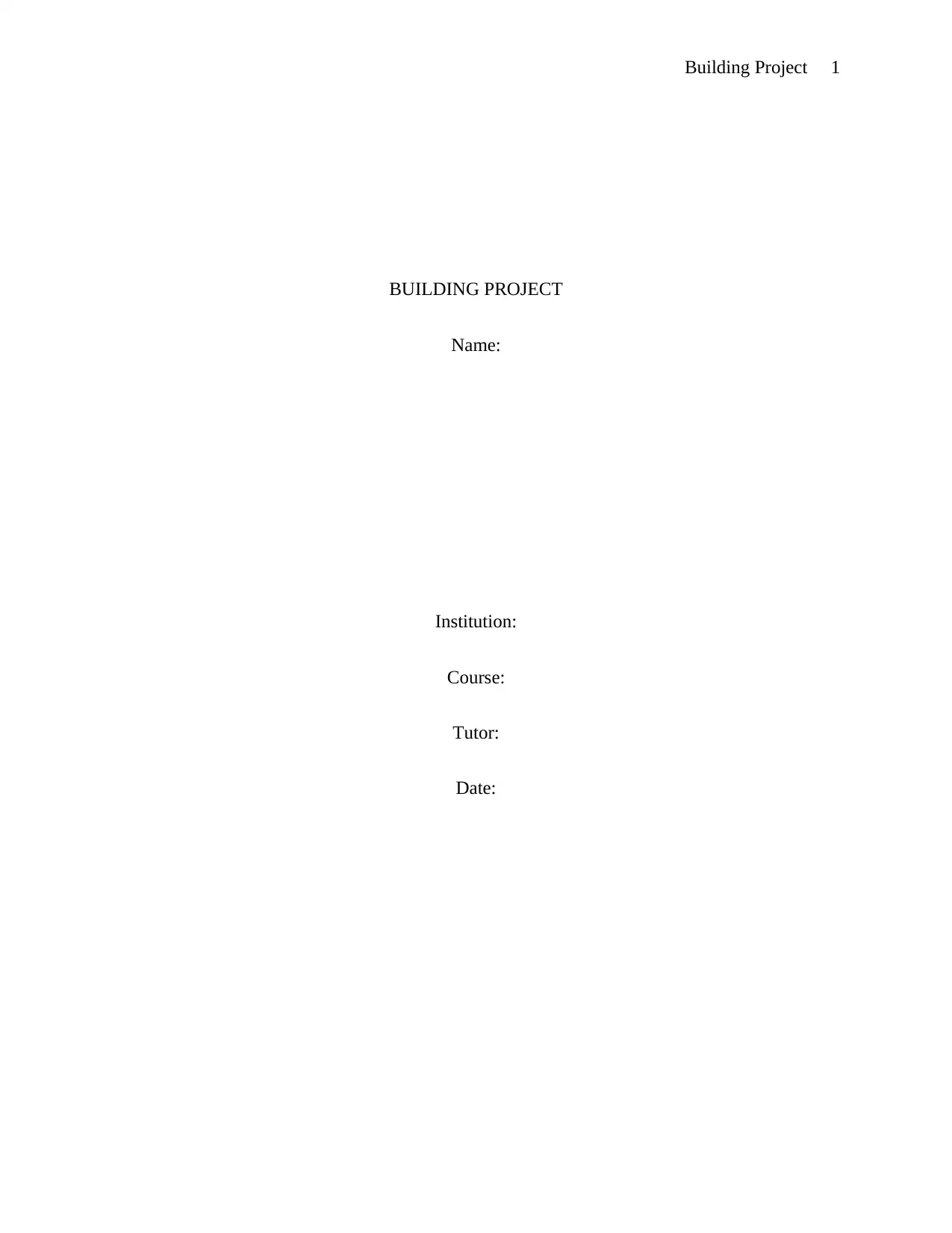
Building Project 1
BUILDING PROJECT
Name:
Institution:
Course:
Tutor:
Date:
BUILDING PROJECT
Name:
Institution:
Course:
Tutor:
Date:
Paraphrase This Document
Need a fresh take? Get an instant paraphrase of this document with our AI Paraphraser
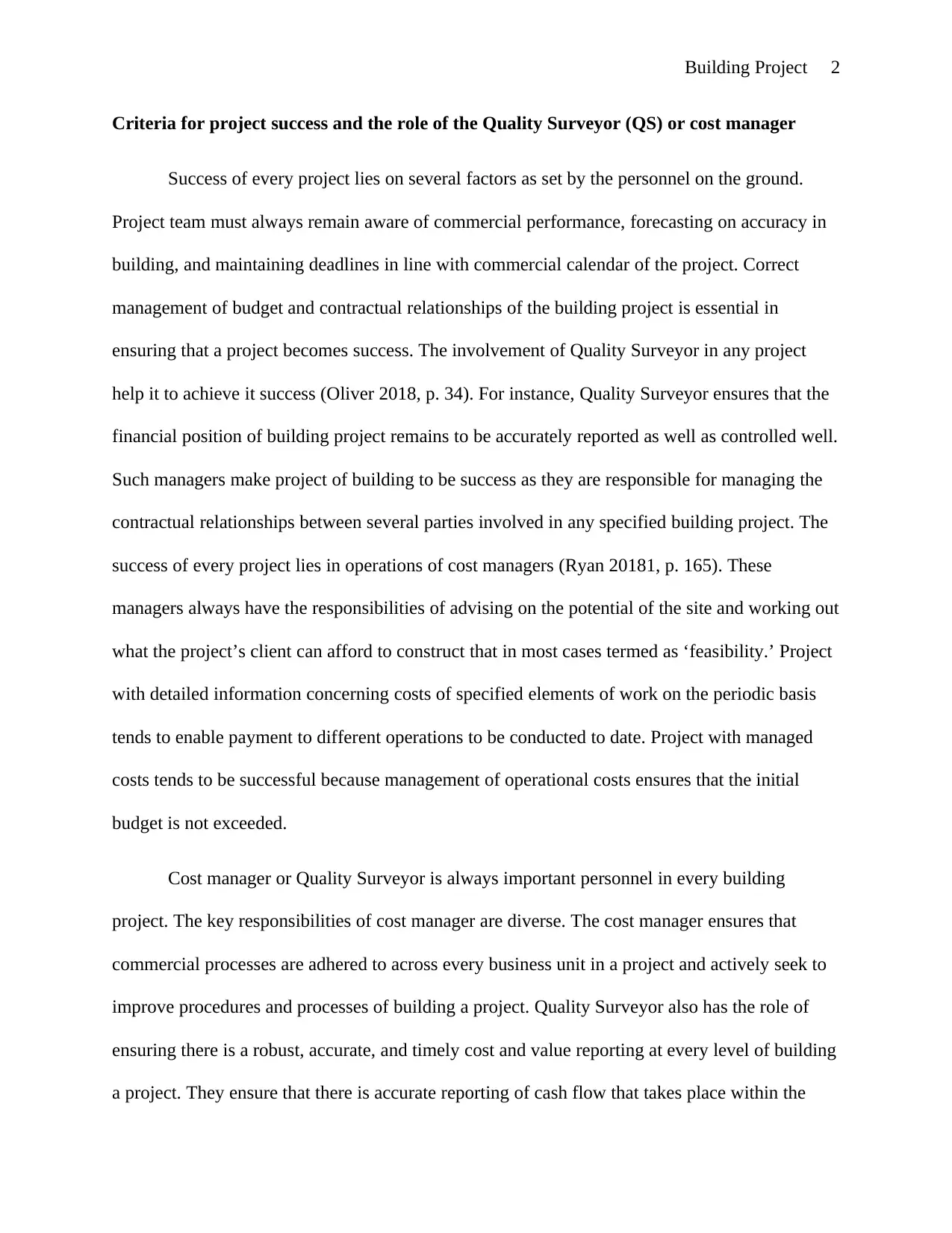
Building Project 2
Criteria for project success and the role of the Quality Surveyor (QS) or cost manager
Success of every project lies on several factors as set by the personnel on the ground.
Project team must always remain aware of commercial performance, forecasting on accuracy in
building, and maintaining deadlines in line with commercial calendar of the project. Correct
management of budget and contractual relationships of the building project is essential in
ensuring that a project becomes success. The involvement of Quality Surveyor in any project
help it to achieve it success (Oliver 2018, p. 34). For instance, Quality Surveyor ensures that the
financial position of building project remains to be accurately reported as well as controlled well.
Such managers make project of building to be success as they are responsible for managing the
contractual relationships between several parties involved in any specified building project. The
success of every project lies in operations of cost managers (Ryan 20181, p. 165). These
managers always have the responsibilities of advising on the potential of the site and working out
what the project’s client can afford to construct that in most cases termed as ‘feasibility.’ Project
with detailed information concerning costs of specified elements of work on the periodic basis
tends to enable payment to different operations to be conducted to date. Project with managed
costs tends to be successful because management of operational costs ensures that the initial
budget is not exceeded.
Cost manager or Quality Surveyor is always important personnel in every building
project. The key responsibilities of cost manager are diverse. The cost manager ensures that
commercial processes are adhered to across every business unit in a project and actively seek to
improve procedures and processes of building a project. Quality Surveyor also has the role of
ensuring there is a robust, accurate, and timely cost and value reporting at every level of building
a project. They ensure that there is accurate reporting of cash flow that takes place within the
Criteria for project success and the role of the Quality Surveyor (QS) or cost manager
Success of every project lies on several factors as set by the personnel on the ground.
Project team must always remain aware of commercial performance, forecasting on accuracy in
building, and maintaining deadlines in line with commercial calendar of the project. Correct
management of budget and contractual relationships of the building project is essential in
ensuring that a project becomes success. The involvement of Quality Surveyor in any project
help it to achieve it success (Oliver 2018, p. 34). For instance, Quality Surveyor ensures that the
financial position of building project remains to be accurately reported as well as controlled well.
Such managers make project of building to be success as they are responsible for managing the
contractual relationships between several parties involved in any specified building project. The
success of every project lies in operations of cost managers (Ryan 20181, p. 165). These
managers always have the responsibilities of advising on the potential of the site and working out
what the project’s client can afford to construct that in most cases termed as ‘feasibility.’ Project
with detailed information concerning costs of specified elements of work on the periodic basis
tends to enable payment to different operations to be conducted to date. Project with managed
costs tends to be successful because management of operational costs ensures that the initial
budget is not exceeded.
Cost manager or Quality Surveyor is always important personnel in every building
project. The key responsibilities of cost manager are diverse. The cost manager ensures that
commercial processes are adhered to across every business unit in a project and actively seek to
improve procedures and processes of building a project. Quality Surveyor also has the role of
ensuring there is a robust, accurate, and timely cost and value reporting at every level of building
a project. They ensure that there is accurate reporting of cash flow that takes place within the
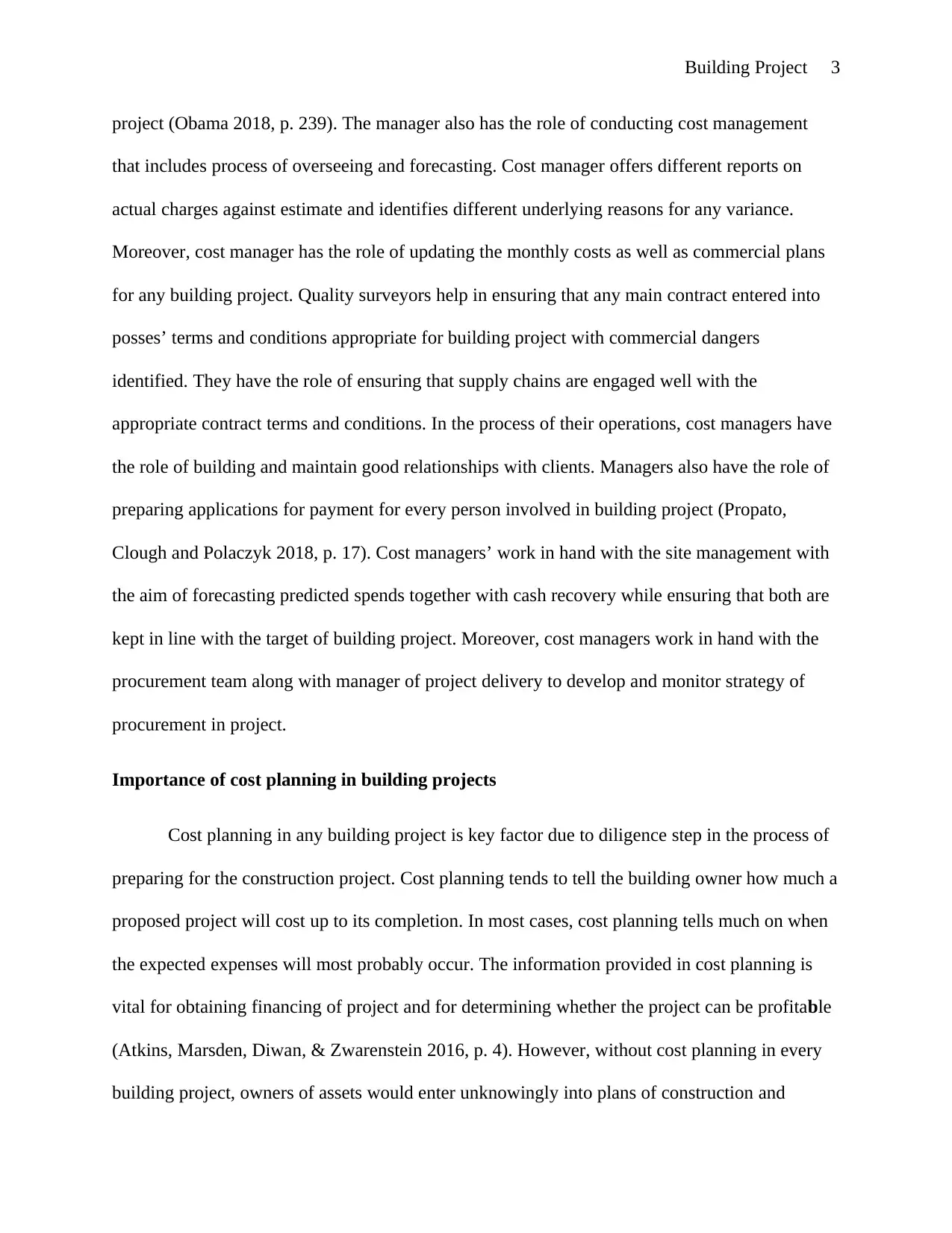
Building Project 3
project (Obama 2018, p. 239). The manager also has the role of conducting cost management
that includes process of overseeing and forecasting. Cost manager offers different reports on
actual charges against estimate and identifies different underlying reasons for any variance.
Moreover, cost manager has the role of updating the monthly costs as well as commercial plans
for any building project. Quality surveyors help in ensuring that any main contract entered into
posses’ terms and conditions appropriate for building project with commercial dangers
identified. They have the role of ensuring that supply chains are engaged well with the
appropriate contract terms and conditions. In the process of their operations, cost managers have
the role of building and maintain good relationships with clients. Managers also have the role of
preparing applications for payment for every person involved in building project (Propato,
Clough and Polaczyk 2018, p. 17). Cost managers’ work in hand with the site management with
the aim of forecasting predicted spends together with cash recovery while ensuring that both are
kept in line with the target of building project. Moreover, cost managers work in hand with the
procurement team along with manager of project delivery to develop and monitor strategy of
procurement in project.
Importance of cost planning in building projects
Cost planning in any building project is key factor due to diligence step in the process of
preparing for the construction project. Cost planning tends to tell the building owner how much a
proposed project will cost up to its completion. In most cases, cost planning tells much on when
the expected expenses will most probably occur. The information provided in cost planning is
vital for obtaining financing of project and for determining whether the project can be profitable
(Atkins, Marsden, Diwan, & Zwarenstein 2016, p. 4). However, without cost planning in every
building project, owners of assets would enter unknowingly into plans of construction and
project (Obama 2018, p. 239). The manager also has the role of conducting cost management
that includes process of overseeing and forecasting. Cost manager offers different reports on
actual charges against estimate and identifies different underlying reasons for any variance.
Moreover, cost manager has the role of updating the monthly costs as well as commercial plans
for any building project. Quality surveyors help in ensuring that any main contract entered into
posses’ terms and conditions appropriate for building project with commercial dangers
identified. They have the role of ensuring that supply chains are engaged well with the
appropriate contract terms and conditions. In the process of their operations, cost managers have
the role of building and maintain good relationships with clients. Managers also have the role of
preparing applications for payment for every person involved in building project (Propato,
Clough and Polaczyk 2018, p. 17). Cost managers’ work in hand with the site management with
the aim of forecasting predicted spends together with cash recovery while ensuring that both are
kept in line with the target of building project. Moreover, cost managers work in hand with the
procurement team along with manager of project delivery to develop and monitor strategy of
procurement in project.
Importance of cost planning in building projects
Cost planning in any building project is key factor due to diligence step in the process of
preparing for the construction project. Cost planning tends to tell the building owner how much a
proposed project will cost up to its completion. In most cases, cost planning tells much on when
the expected expenses will most probably occur. The information provided in cost planning is
vital for obtaining financing of project and for determining whether the project can be profitable
(Atkins, Marsden, Diwan, & Zwarenstein 2016, p. 4). However, without cost planning in every
building project, owners of assets would enter unknowingly into plans of construction and
⊘ This is a preview!⊘
Do you want full access?
Subscribe today to unlock all pages.

Trusted by 1+ million students worldwide
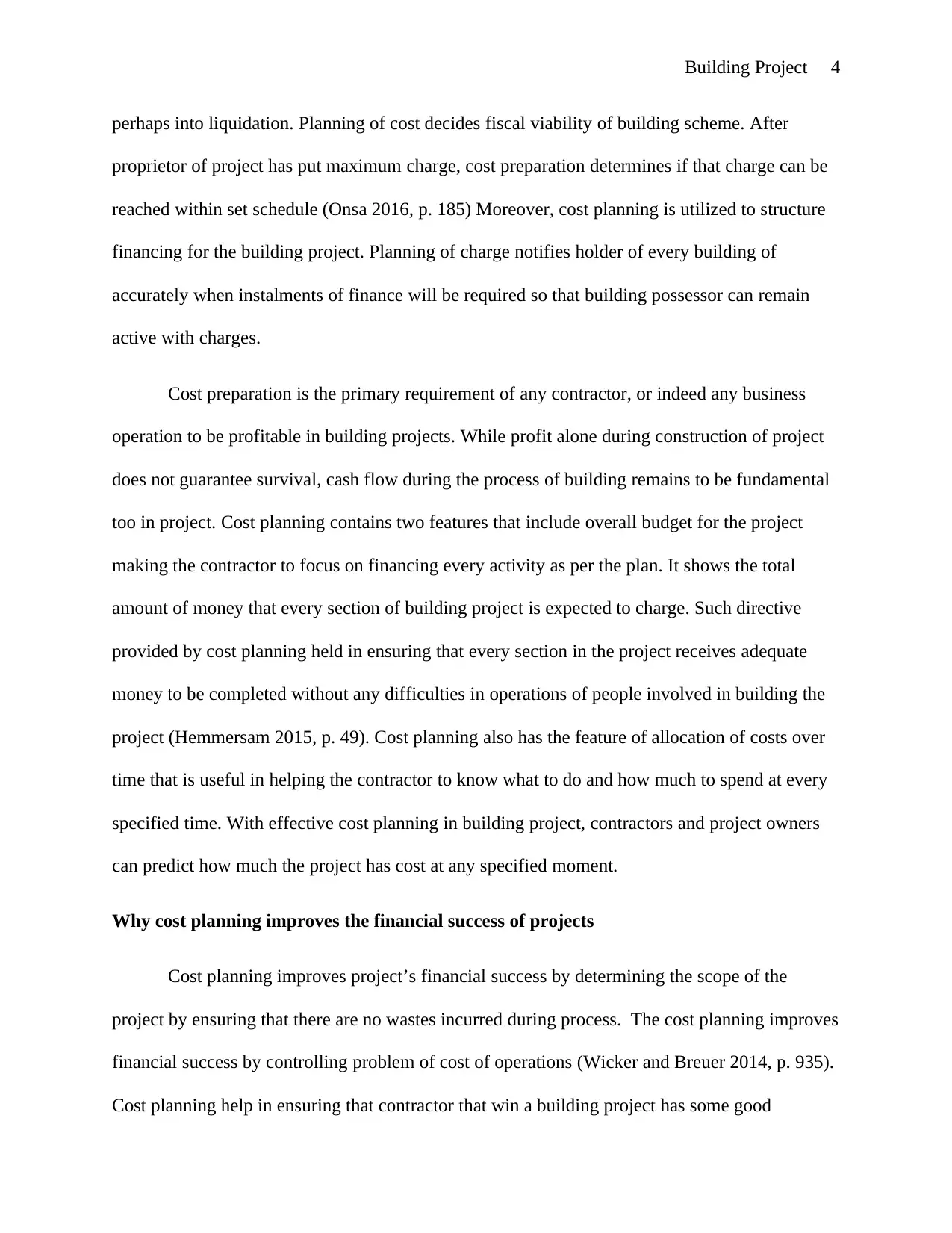
Building Project 4
perhaps into liquidation. Planning of cost decides fiscal viability of building scheme. After
proprietor of project has put maximum charge, cost preparation determines if that charge can be
reached within set schedule (Onsa 2016, p. 185) Moreover, cost planning is utilized to structure
financing for the building project. Planning of charge notifies holder of every building of
accurately when instalments of finance will be required so that building possessor can remain
active with charges.
Cost preparation is the primary requirement of any contractor, or indeed any business
operation to be profitable in building projects. While profit alone during construction of project
does not guarantee survival, cash flow during the process of building remains to be fundamental
too in project. Cost planning contains two features that include overall budget for the project
making the contractor to focus on financing every activity as per the plan. It shows the total
amount of money that every section of building project is expected to charge. Such directive
provided by cost planning held in ensuring that every section in the project receives adequate
money to be completed without any difficulties in operations of people involved in building the
project (Hemmersam 2015, p. 49). Cost planning also has the feature of allocation of costs over
time that is useful in helping the contractor to know what to do and how much to spend at every
specified time. With effective cost planning in building project, contractors and project owners
can predict how much the project has cost at any specified moment.
Why cost planning improves the financial success of projects
Cost planning improves project’s financial success by determining the scope of the
project by ensuring that there are no wastes incurred during process. The cost planning improves
financial success by controlling problem of cost of operations (Wicker and Breuer 2014, p. 935).
Cost planning help in ensuring that contractor that win a building project has some good
perhaps into liquidation. Planning of cost decides fiscal viability of building scheme. After
proprietor of project has put maximum charge, cost preparation determines if that charge can be
reached within set schedule (Onsa 2016, p. 185) Moreover, cost planning is utilized to structure
financing for the building project. Planning of charge notifies holder of every building of
accurately when instalments of finance will be required so that building possessor can remain
active with charges.
Cost preparation is the primary requirement of any contractor, or indeed any business
operation to be profitable in building projects. While profit alone during construction of project
does not guarantee survival, cash flow during the process of building remains to be fundamental
too in project. Cost planning contains two features that include overall budget for the project
making the contractor to focus on financing every activity as per the plan. It shows the total
amount of money that every section of building project is expected to charge. Such directive
provided by cost planning held in ensuring that every section in the project receives adequate
money to be completed without any difficulties in operations of people involved in building the
project (Hemmersam 2015, p. 49). Cost planning also has the feature of allocation of costs over
time that is useful in helping the contractor to know what to do and how much to spend at every
specified time. With effective cost planning in building project, contractors and project owners
can predict how much the project has cost at any specified moment.
Why cost planning improves the financial success of projects
Cost planning improves project’s financial success by determining the scope of the
project by ensuring that there are no wastes incurred during process. The cost planning improves
financial success by controlling problem of cost of operations (Wicker and Breuer 2014, p. 935).
Cost planning help in ensuring that contractor that win a building project has some good
Paraphrase This Document
Need a fresh take? Get an instant paraphrase of this document with our AI Paraphraser
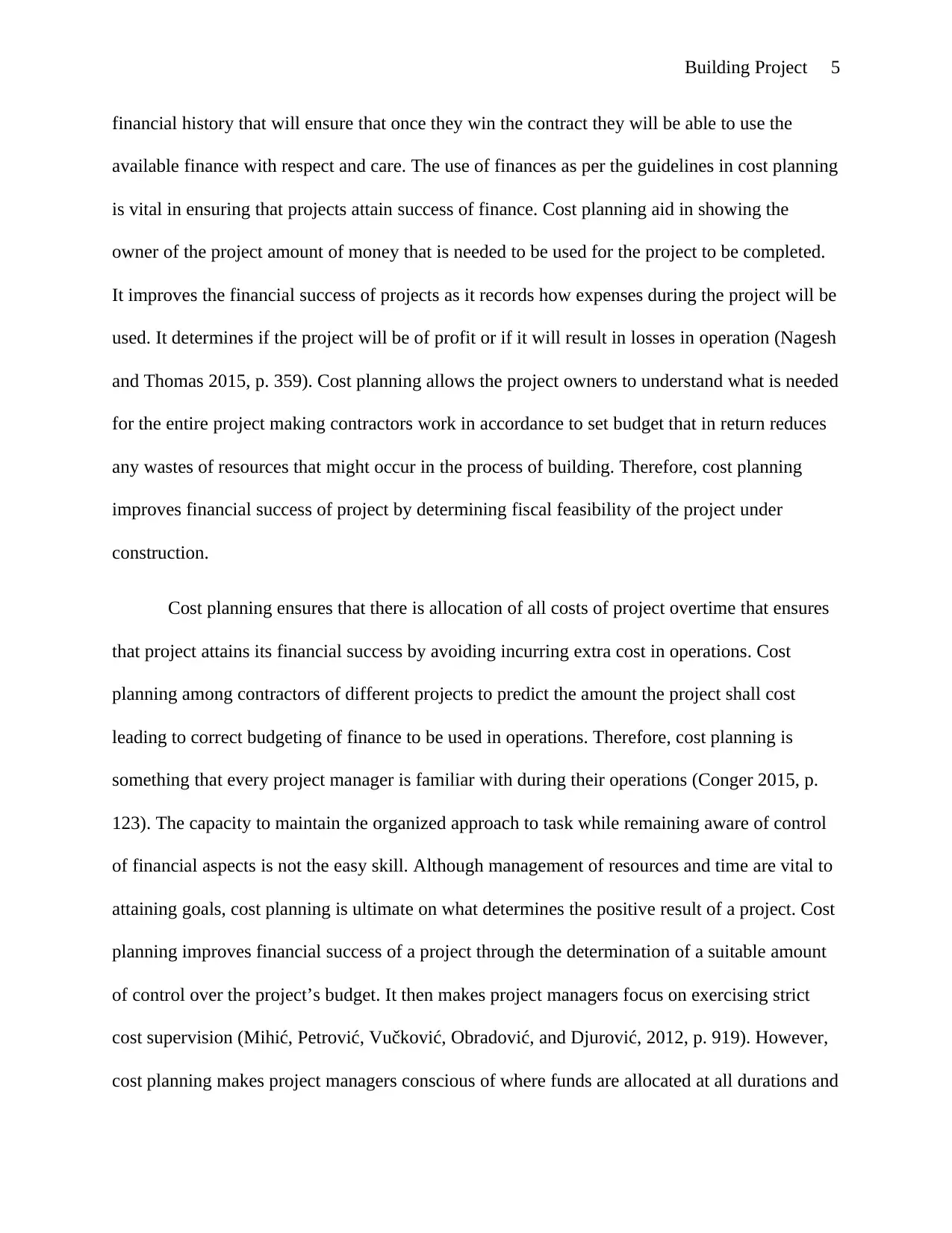
Building Project 5
financial history that will ensure that once they win the contract they will be able to use the
available finance with respect and care. The use of finances as per the guidelines in cost planning
is vital in ensuring that projects attain success of finance. Cost planning aid in showing the
owner of the project amount of money that is needed to be used for the project to be completed.
It improves the financial success of projects as it records how expenses during the project will be
used. It determines if the project will be of profit or if it will result in losses in operation (Nagesh
and Thomas 2015, p. 359). Cost planning allows the project owners to understand what is needed
for the entire project making contractors work in accordance to set budget that in return reduces
any wastes of resources that might occur in the process of building. Therefore, cost planning
improves financial success of project by determining fiscal feasibility of the project under
construction.
Cost planning ensures that there is allocation of all costs of project overtime that ensures
that project attains its financial success by avoiding incurring extra cost in operations. Cost
planning among contractors of different projects to predict the amount the project shall cost
leading to correct budgeting of finance to be used in operations. Therefore, cost planning is
something that every project manager is familiar with during their operations (Conger 2015, p.
123). The capacity to maintain the organized approach to task while remaining aware of control
of financial aspects is not the easy skill. Although management of resources and time are vital to
attaining goals, cost planning is ultimate on what determines the positive result of a project. Cost
planning improves financial success of a project through the determination of a suitable amount
of control over the project’s budget. It then makes project managers focus on exercising strict
cost supervision (Mihić, Petrović, Vučković, Obradović, and Djurović, 2012, p. 919). However,
cost planning makes project managers conscious of where funds are allocated at all durations and
financial history that will ensure that once they win the contract they will be able to use the
available finance with respect and care. The use of finances as per the guidelines in cost planning
is vital in ensuring that projects attain success of finance. Cost planning aid in showing the
owner of the project amount of money that is needed to be used for the project to be completed.
It improves the financial success of projects as it records how expenses during the project will be
used. It determines if the project will be of profit or if it will result in losses in operation (Nagesh
and Thomas 2015, p. 359). Cost planning allows the project owners to understand what is needed
for the entire project making contractors work in accordance to set budget that in return reduces
any wastes of resources that might occur in the process of building. Therefore, cost planning
improves financial success of project by determining fiscal feasibility of the project under
construction.
Cost planning ensures that there is allocation of all costs of project overtime that ensures
that project attains its financial success by avoiding incurring extra cost in operations. Cost
planning among contractors of different projects to predict the amount the project shall cost
leading to correct budgeting of finance to be used in operations. Therefore, cost planning is
something that every project manager is familiar with during their operations (Conger 2015, p.
123). The capacity to maintain the organized approach to task while remaining aware of control
of financial aspects is not the easy skill. Although management of resources and time are vital to
attaining goals, cost planning is ultimate on what determines the positive result of a project. Cost
planning improves financial success of a project through the determination of a suitable amount
of control over the project’s budget. It then makes project managers focus on exercising strict
cost supervision (Mihić, Petrović, Vučković, Obradović, and Djurović, 2012, p. 919). However,
cost planning makes project managers conscious of where funds are allocated at all durations and
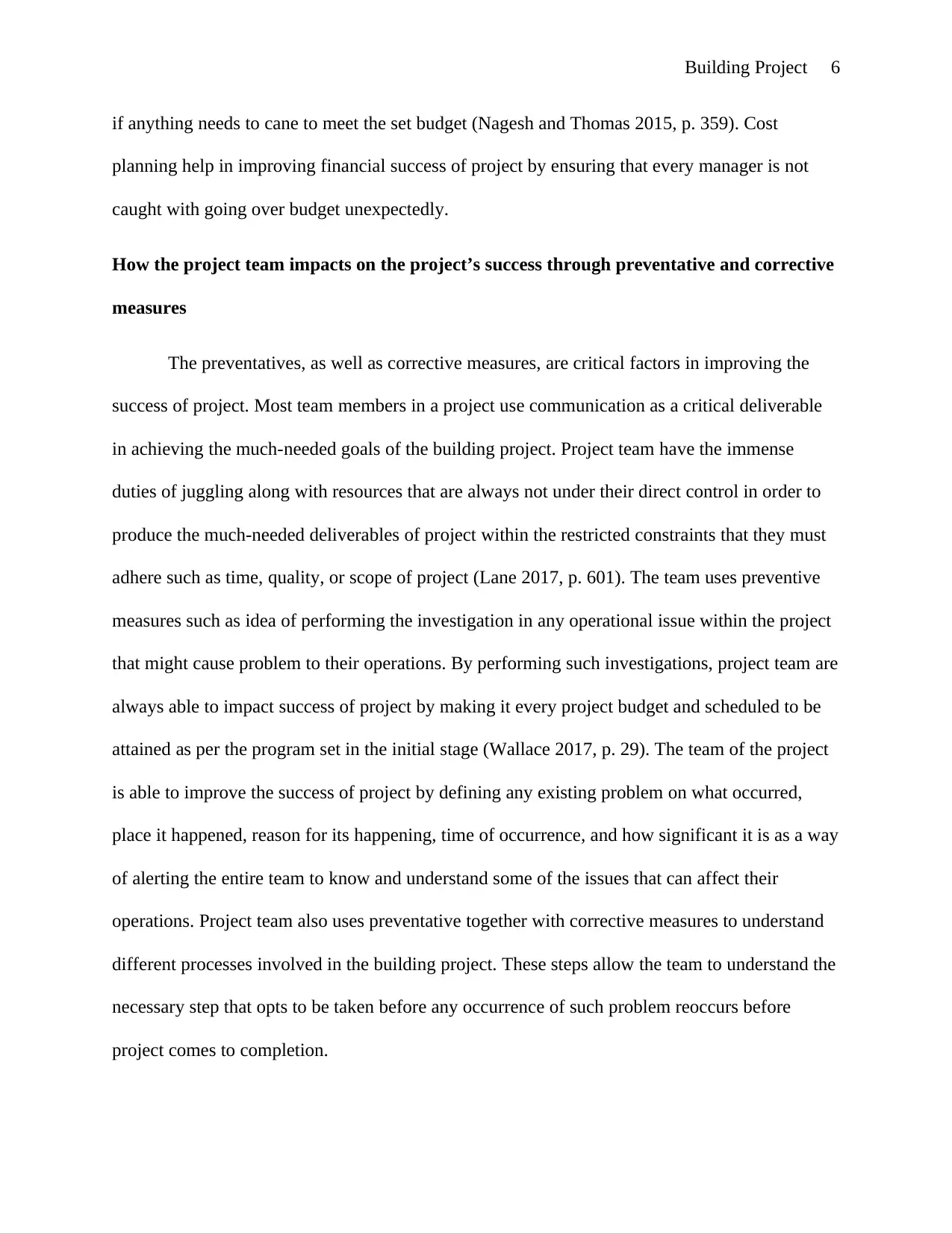
Building Project 6
if anything needs to cane to meet the set budget (Nagesh and Thomas 2015, p. 359). Cost
planning help in improving financial success of project by ensuring that every manager is not
caught with going over budget unexpectedly.
How the project team impacts on the project’s success through preventative and corrective
measures
The preventatives, as well as corrective measures, are critical factors in improving the
success of project. Most team members in a project use communication as a critical deliverable
in achieving the much-needed goals of the building project. Project team have the immense
duties of juggling along with resources that are always not under their direct control in order to
produce the much-needed deliverables of project within the restricted constraints that they must
adhere such as time, quality, or scope of project (Lane 2017, p. 601). The team uses preventive
measures such as idea of performing the investigation in any operational issue within the project
that might cause problem to their operations. By performing such investigations, project team are
always able to impact success of project by making it every project budget and scheduled to be
attained as per the program set in the initial stage (Wallace 2017, p. 29). The team of the project
is able to improve the success of project by defining any existing problem on what occurred,
place it happened, reason for its happening, time of occurrence, and how significant it is as a way
of alerting the entire team to know and understand some of the issues that can affect their
operations. Project team also uses preventative together with corrective measures to understand
different processes involved in the building project. These steps allow the team to understand the
necessary step that opts to be taken before any occurrence of such problem reoccurs before
project comes to completion.
if anything needs to cane to meet the set budget (Nagesh and Thomas 2015, p. 359). Cost
planning help in improving financial success of project by ensuring that every manager is not
caught with going over budget unexpectedly.
How the project team impacts on the project’s success through preventative and corrective
measures
The preventatives, as well as corrective measures, are critical factors in improving the
success of project. Most team members in a project use communication as a critical deliverable
in achieving the much-needed goals of the building project. Project team have the immense
duties of juggling along with resources that are always not under their direct control in order to
produce the much-needed deliverables of project within the restricted constraints that they must
adhere such as time, quality, or scope of project (Lane 2017, p. 601). The team uses preventive
measures such as idea of performing the investigation in any operational issue within the project
that might cause problem to their operations. By performing such investigations, project team are
always able to impact success of project by making it every project budget and scheduled to be
attained as per the program set in the initial stage (Wallace 2017, p. 29). The team of the project
is able to improve the success of project by defining any existing problem on what occurred,
place it happened, reason for its happening, time of occurrence, and how significant it is as a way
of alerting the entire team to know and understand some of the issues that can affect their
operations. Project team also uses preventative together with corrective measures to understand
different processes involved in the building project. These steps allow the team to understand the
necessary step that opts to be taken before any occurrence of such problem reoccurs before
project comes to completion.
⊘ This is a preview!⊘
Do you want full access?
Subscribe today to unlock all pages.

Trusted by 1+ million students worldwide
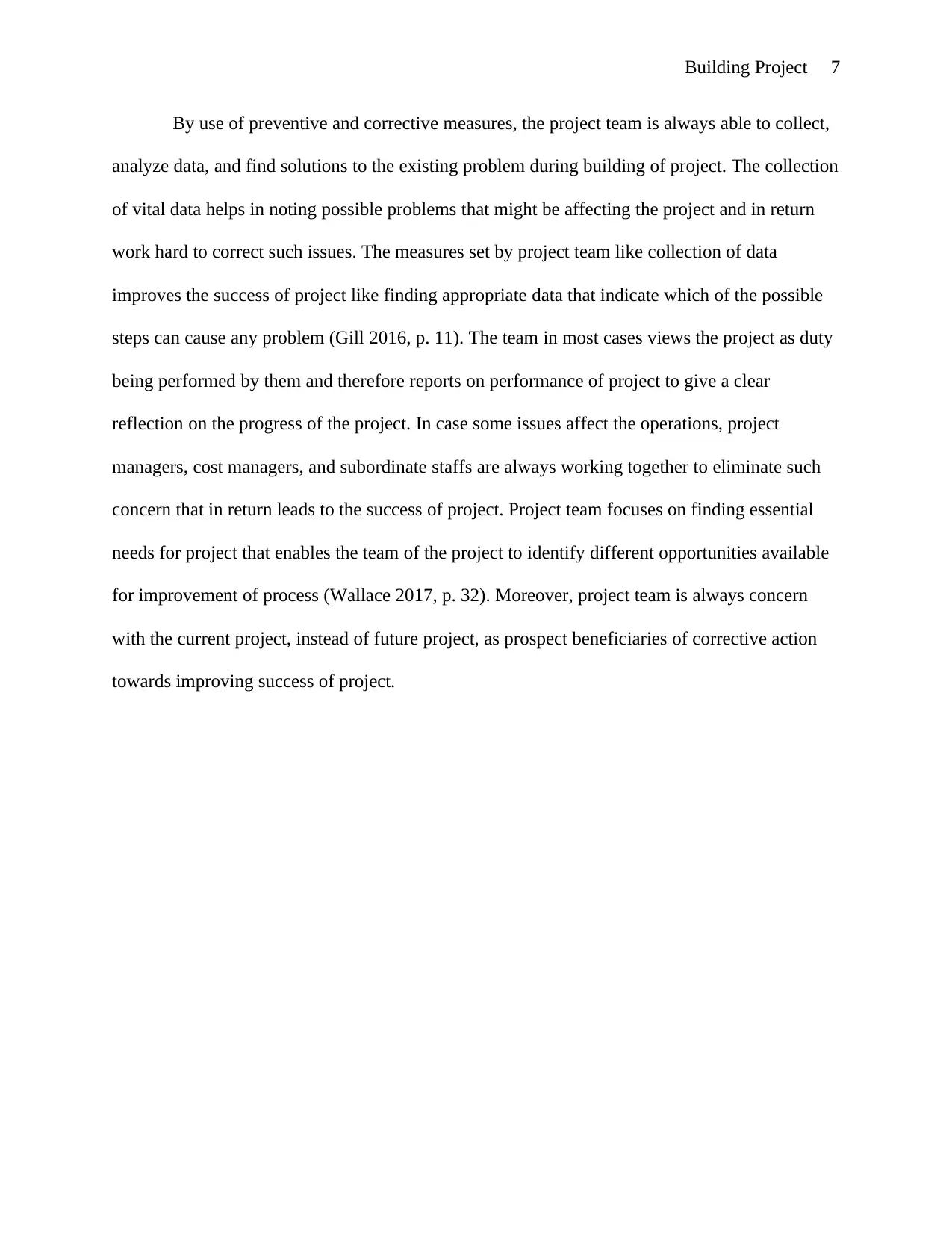
Building Project 7
By use of preventive and corrective measures, the project team is always able to collect,
analyze data, and find solutions to the existing problem during building of project. The collection
of vital data helps in noting possible problems that might be affecting the project and in return
work hard to correct such issues. The measures set by project team like collection of data
improves the success of project like finding appropriate data that indicate which of the possible
steps can cause any problem (Gill 2016, p. 11). The team in most cases views the project as duty
being performed by them and therefore reports on performance of project to give a clear
reflection on the progress of the project. In case some issues affect the operations, project
managers, cost managers, and subordinate staffs are always working together to eliminate such
concern that in return leads to the success of project. Project team focuses on finding essential
needs for project that enables the team of the project to identify different opportunities available
for improvement of process (Wallace 2017, p. 32). Moreover, project team is always concern
with the current project, instead of future project, as prospect beneficiaries of corrective action
towards improving success of project.
By use of preventive and corrective measures, the project team is always able to collect,
analyze data, and find solutions to the existing problem during building of project. The collection
of vital data helps in noting possible problems that might be affecting the project and in return
work hard to correct such issues. The measures set by project team like collection of data
improves the success of project like finding appropriate data that indicate which of the possible
steps can cause any problem (Gill 2016, p. 11). The team in most cases views the project as duty
being performed by them and therefore reports on performance of project to give a clear
reflection on the progress of the project. In case some issues affect the operations, project
managers, cost managers, and subordinate staffs are always working together to eliminate such
concern that in return leads to the success of project. Project team focuses on finding essential
needs for project that enables the team of the project to identify different opportunities available
for improvement of process (Wallace 2017, p. 32). Moreover, project team is always concern
with the current project, instead of future project, as prospect beneficiaries of corrective action
towards improving success of project.
Paraphrase This Document
Need a fresh take? Get an instant paraphrase of this document with our AI Paraphraser
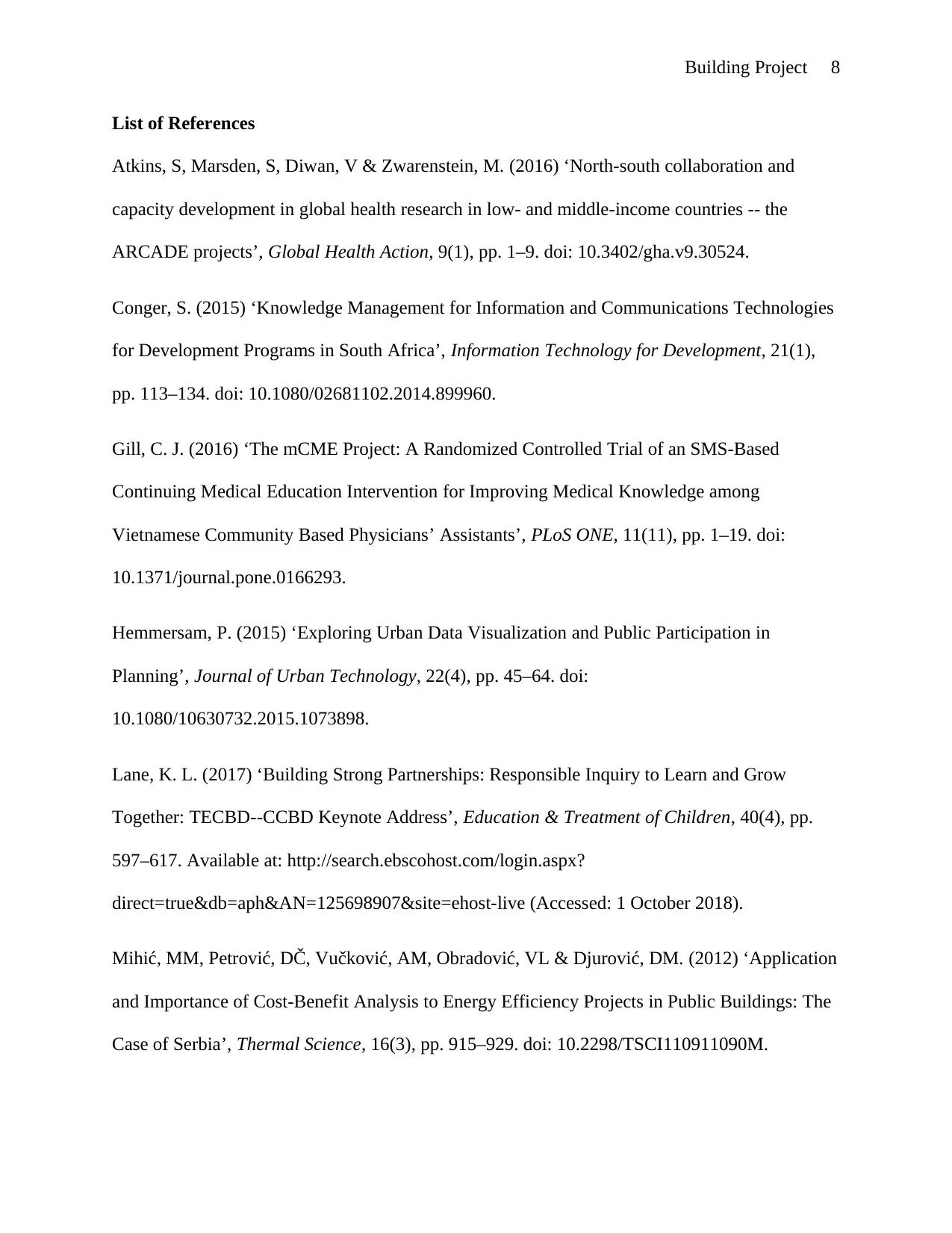
Building Project 8
List of References
Atkins, S, Marsden, S, Diwan, V & Zwarenstein, M. (2016) ‘North-south collaboration and
capacity development in global health research in low- and middle-income countries -- the
ARCADE projects’, Global Health Action, 9(1), pp. 1–9. doi: 10.3402/gha.v9.30524.
Conger, S. (2015) ‘Knowledge Management for Information and Communications Technologies
for Development Programs in South Africa’, Information Technology for Development, 21(1),
pp. 113–134. doi: 10.1080/02681102.2014.899960.
Gill, C. J. (2016) ‘The mCME Project: A Randomized Controlled Trial of an SMS-Based
Continuing Medical Education Intervention for Improving Medical Knowledge among
Vietnamese Community Based Physicians’ Assistants’, PLoS ONE, 11(11), pp. 1–19. doi:
10.1371/journal.pone.0166293.
Hemmersam, P. (2015) ‘Exploring Urban Data Visualization and Public Participation in
Planning’, Journal of Urban Technology, 22(4), pp. 45–64. doi:
10.1080/10630732.2015.1073898.
Lane, K. L. (2017) ‘Building Strong Partnerships: Responsible Inquiry to Learn and Grow
Together: TECBD--CCBD Keynote Address’, Education & Treatment of Children, 40(4), pp.
597–617. Available at: http://search.ebscohost.com/login.aspx?
direct=true&db=aph&AN=125698907&site=ehost-live (Accessed: 1 October 2018).
Mihić, MM, Petrović, DČ, Vučković, AM, Obradović, VL & Djurović, DM. (2012) ‘Application
and Importance of Cost-Benefit Analysis to Energy Efficiency Projects in Public Buildings: The
Case of Serbia’, Thermal Science, 16(3), pp. 915–929. doi: 10.2298/TSCI110911090M.
List of References
Atkins, S, Marsden, S, Diwan, V & Zwarenstein, M. (2016) ‘North-south collaboration and
capacity development in global health research in low- and middle-income countries -- the
ARCADE projects’, Global Health Action, 9(1), pp. 1–9. doi: 10.3402/gha.v9.30524.
Conger, S. (2015) ‘Knowledge Management for Information and Communications Technologies
for Development Programs in South Africa’, Information Technology for Development, 21(1),
pp. 113–134. doi: 10.1080/02681102.2014.899960.
Gill, C. J. (2016) ‘The mCME Project: A Randomized Controlled Trial of an SMS-Based
Continuing Medical Education Intervention for Improving Medical Knowledge among
Vietnamese Community Based Physicians’ Assistants’, PLoS ONE, 11(11), pp. 1–19. doi:
10.1371/journal.pone.0166293.
Hemmersam, P. (2015) ‘Exploring Urban Data Visualization and Public Participation in
Planning’, Journal of Urban Technology, 22(4), pp. 45–64. doi:
10.1080/10630732.2015.1073898.
Lane, K. L. (2017) ‘Building Strong Partnerships: Responsible Inquiry to Learn and Grow
Together: TECBD--CCBD Keynote Address’, Education & Treatment of Children, 40(4), pp.
597–617. Available at: http://search.ebscohost.com/login.aspx?
direct=true&db=aph&AN=125698907&site=ehost-live (Accessed: 1 October 2018).
Mihić, MM, Petrović, DČ, Vučković, AM, Obradović, VL & Djurović, DM. (2012) ‘Application
and Importance of Cost-Benefit Analysis to Energy Efficiency Projects in Public Buildings: The
Case of Serbia’, Thermal Science, 16(3), pp. 915–929. doi: 10.2298/TSCI110911090M.
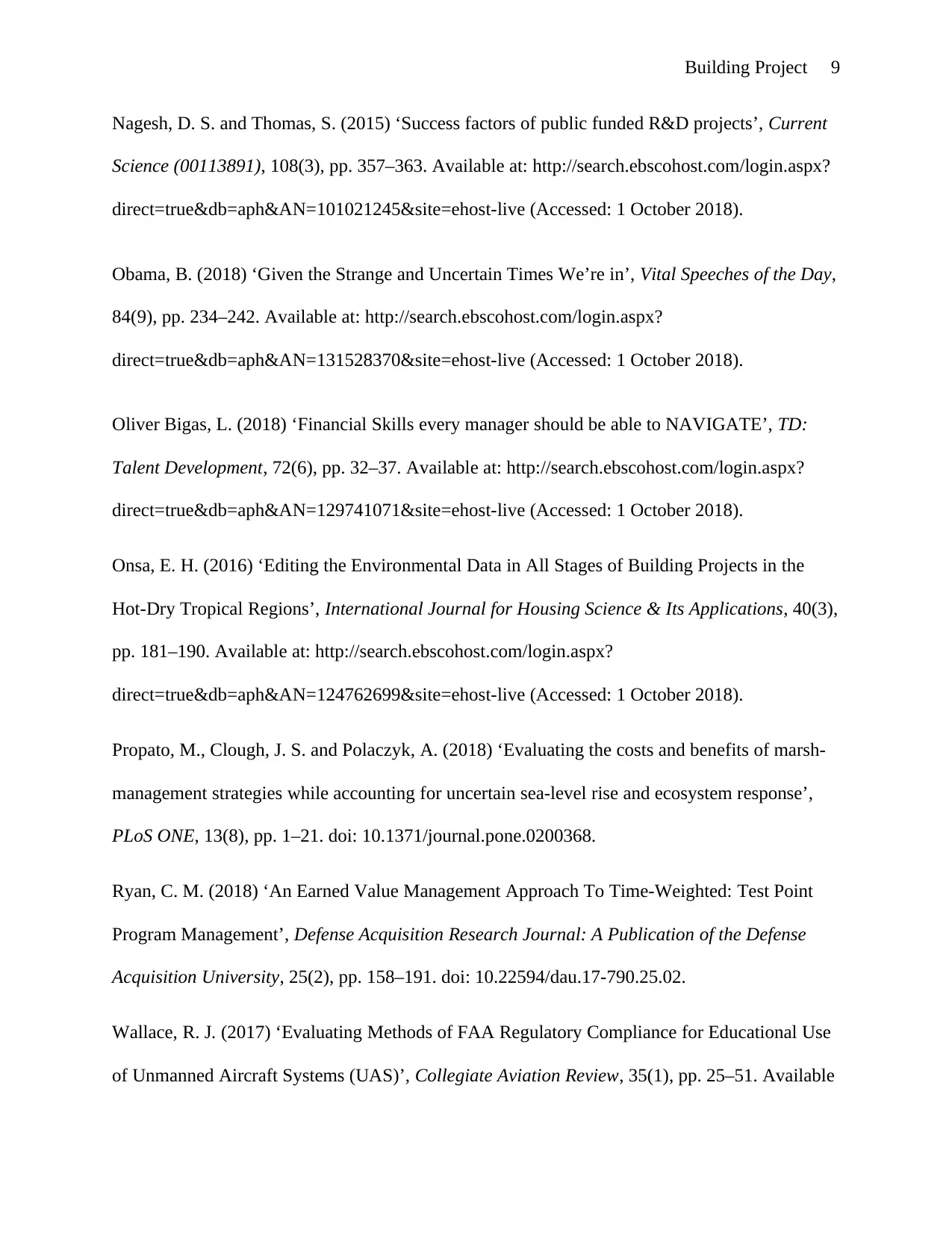
Building Project 9
Nagesh, D. S. and Thomas, S. (2015) ‘Success factors of public funded R&D projects’, Current
Science (00113891), 108(3), pp. 357–363. Available at: http://search.ebscohost.com/login.aspx?
direct=true&db=aph&AN=101021245&site=ehost-live (Accessed: 1 October 2018).
Obama, B. (2018) ‘Given the Strange and Uncertain Times We’re in’, Vital Speeches of the Day,
84(9), pp. 234–242. Available at: http://search.ebscohost.com/login.aspx?
direct=true&db=aph&AN=131528370&site=ehost-live (Accessed: 1 October 2018).
Oliver Bigas, L. (2018) ‘Financial Skills every manager should be able to NAVIGATE’, TD:
Talent Development, 72(6), pp. 32–37. Available at: http://search.ebscohost.com/login.aspx?
direct=true&db=aph&AN=129741071&site=ehost-live (Accessed: 1 October 2018).
Onsa, E. H. (2016) ‘Editing the Environmental Data in All Stages of Building Projects in the
Hot-Dry Tropical Regions’, International Journal for Housing Science & Its Applications, 40(3),
pp. 181–190. Available at: http://search.ebscohost.com/login.aspx?
direct=true&db=aph&AN=124762699&site=ehost-live (Accessed: 1 October 2018).
Propato, M., Clough, J. S. and Polaczyk, A. (2018) ‘Evaluating the costs and benefits of marsh-
management strategies while accounting for uncertain sea-level rise and ecosystem response’,
PLoS ONE, 13(8), pp. 1–21. doi: 10.1371/journal.pone.0200368.
Ryan, C. M. (2018) ‘An Earned Value Management Approach To Time-Weighted: Test Point
Program Management’, Defense Acquisition Research Journal: A Publication of the Defense
Acquisition University, 25(2), pp. 158–191. doi: 10.22594/dau.17-790.25.02.
Wallace, R. J. (2017) ‘Evaluating Methods of FAA Regulatory Compliance for Educational Use
of Unmanned Aircraft Systems (UAS)’, Collegiate Aviation Review, 35(1), pp. 25–51. Available
Nagesh, D. S. and Thomas, S. (2015) ‘Success factors of public funded R&D projects’, Current
Science (00113891), 108(3), pp. 357–363. Available at: http://search.ebscohost.com/login.aspx?
direct=true&db=aph&AN=101021245&site=ehost-live (Accessed: 1 October 2018).
Obama, B. (2018) ‘Given the Strange and Uncertain Times We’re in’, Vital Speeches of the Day,
84(9), pp. 234–242. Available at: http://search.ebscohost.com/login.aspx?
direct=true&db=aph&AN=131528370&site=ehost-live (Accessed: 1 October 2018).
Oliver Bigas, L. (2018) ‘Financial Skills every manager should be able to NAVIGATE’, TD:
Talent Development, 72(6), pp. 32–37. Available at: http://search.ebscohost.com/login.aspx?
direct=true&db=aph&AN=129741071&site=ehost-live (Accessed: 1 October 2018).
Onsa, E. H. (2016) ‘Editing the Environmental Data in All Stages of Building Projects in the
Hot-Dry Tropical Regions’, International Journal for Housing Science & Its Applications, 40(3),
pp. 181–190. Available at: http://search.ebscohost.com/login.aspx?
direct=true&db=aph&AN=124762699&site=ehost-live (Accessed: 1 October 2018).
Propato, M., Clough, J. S. and Polaczyk, A. (2018) ‘Evaluating the costs and benefits of marsh-
management strategies while accounting for uncertain sea-level rise and ecosystem response’,
PLoS ONE, 13(8), pp. 1–21. doi: 10.1371/journal.pone.0200368.
Ryan, C. M. (2018) ‘An Earned Value Management Approach To Time-Weighted: Test Point
Program Management’, Defense Acquisition Research Journal: A Publication of the Defense
Acquisition University, 25(2), pp. 158–191. doi: 10.22594/dau.17-790.25.02.
Wallace, R. J. (2017) ‘Evaluating Methods of FAA Regulatory Compliance for Educational Use
of Unmanned Aircraft Systems (UAS)’, Collegiate Aviation Review, 35(1), pp. 25–51. Available
⊘ This is a preview!⊘
Do you want full access?
Subscribe today to unlock all pages.

Trusted by 1+ million students worldwide
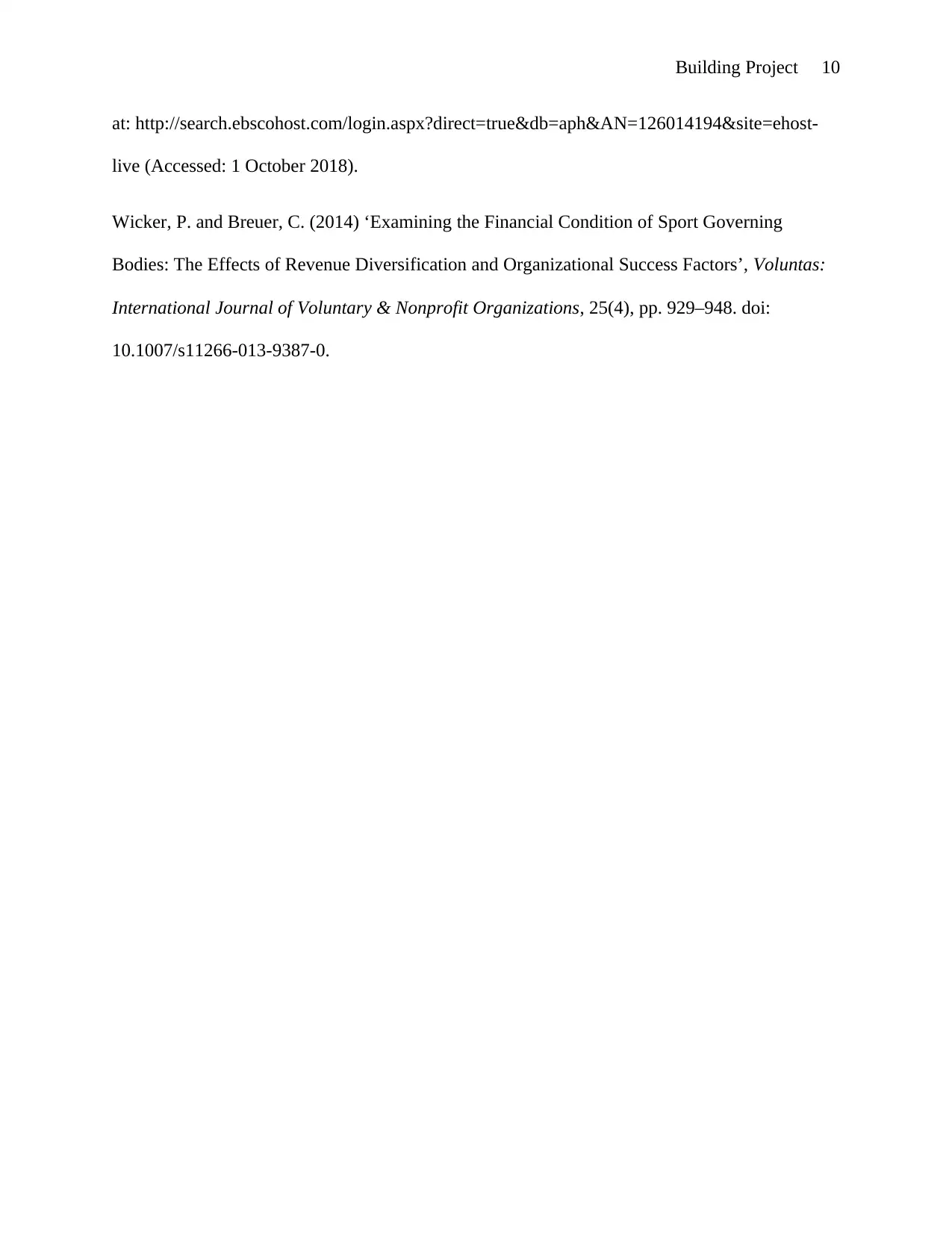
Building Project 10
at: http://search.ebscohost.com/login.aspx?direct=true&db=aph&AN=126014194&site=ehost-
live (Accessed: 1 October 2018).
Wicker, P. and Breuer, C. (2014) ‘Examining the Financial Condition of Sport Governing
Bodies: The Effects of Revenue Diversification and Organizational Success Factors’, Voluntas:
International Journal of Voluntary & Nonprofit Organizations, 25(4), pp. 929–948. doi:
10.1007/s11266-013-9387-0.
at: http://search.ebscohost.com/login.aspx?direct=true&db=aph&AN=126014194&site=ehost-
live (Accessed: 1 October 2018).
Wicker, P. and Breuer, C. (2014) ‘Examining the Financial Condition of Sport Governing
Bodies: The Effects of Revenue Diversification and Organizational Success Factors’, Voluntas:
International Journal of Voluntary & Nonprofit Organizations, 25(4), pp. 929–948. doi:
10.1007/s11266-013-9387-0.
1 out of 10
Related Documents
Your All-in-One AI-Powered Toolkit for Academic Success.
+13062052269
info@desklib.com
Available 24*7 on WhatsApp / Email
![[object Object]](/_next/static/media/star-bottom.7253800d.svg)
Unlock your academic potential
Copyright © 2020–2025 A2Z Services. All Rights Reserved. Developed and managed by ZUCOL.




